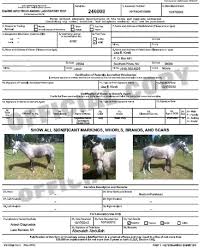Main Content

The Coggins test is named for Leroy Coggins. He is the veterinarian who developed the test to detect antibodies against the equine infectious anemia virus (EIA) in 1970. It is important to note that once infected with EIA, an animal remains infected for life. Infections in horses are rare but incurable, and there is no available vaccine. That is why identifying the animals who are carrying the virus is very important. All horse shows should require a negative Coggins test within 12 months from every animal.
The EIA virus is a member of the same family as human immunodeficiency virus. EIA affected horses (and ponies, mules or donkeys) will have fevers, anemia (low red blood cell count), edema (stocking up), weight loss or muscle wasting. It can also be fatal. The most common form of the disease is the chronic form. In horses with the chronic form of the disease, the virus stays in the animal’s tissues and the animal will always be infectious. For this reason, it is just as important to test horses that do not leave your property as well as those that do. EIA also has an inapparent form; affected horses might only show a slight fever for a day or may be totally without outward signs of the infection.
EIA is a blood-borne disease. The virus is found throughout the world and has been around for centuries. Its prevalence in the United States began in the 1930’s and reached its peak between the ’60s and ’70s. In 1975, over 10,000 cases of EIA infection were detected in the United States. Many of those animals exhibited severe clinical signs, and some died. Today, the majority of the equine found with the infection are “inapparent carriers”, which means they show no outward signs of the disease, but the virus is found when the animal is tested.
It is important to know that this disease is not spread horse to horse. The most common vectors for this disease are biting flies, particularly horseflies. The flies are blood feeders and can carry the virus on their mouth parts from one infected horse to others. Because it is a blood borne disease, there have also been cases linked to reuse of needles. It is important to follow correct vaccination protocol and never reuse needles.
There is no vaccine or treatment for the disease, and it can be difficult to differentiate from other fever-producing diseases like influenza and encephalitis. Because of the lack of vaccine, it is important to frequently test for the disease. Many shows and exhibitions require a negative Coggins test within the past 12 months. If you transport a horse in the State of New Jersey, you must be able to produce a negative Coggins test if you are stopped by a State Trooper. It is a state law. In the US, all equines shipped across state lines must be tested for EIA with a negative result within 12 months of transport. All equines sold, traded, or donated within a state must have tested negative for EIA within 12 months of an ownership change. All equines entering auctions or sale markets are required to have a negative test before sale, or the horse must be held in quarantine within the state until the test results are known.
It is recommended that all horse owners implement an EIA control plan for their premises. All horses should be tested every 12 months as part of a routine health program. More frequent testing may be indicated in areas that perennially have a high incidence of EIA. Owners of equines entering shows or competitive events should present proof to event officials of a negative EIA test. All new equines introduced to a herd should have a negative EIA test before entry or be isolated while tests are pending. Vector control practices, including application of insecticides and repellents and environmental insect control, should be implemented. Good hygiene and disinfection principles should be maintained to prevent infection from contaminated needles, syringes, or equipment.
For more information:
https://aaep.org/horsehealth/equine-infectious-anemia
https://foundationequineclinic.com/…/why-does-my-horse-need-a-coggins-test-if-we-do…
https://ker.com/equinews/what-is-a-coggins-test/
By Carol K. Ward, County 4-H Agent, Rutgers Cooperative Extension